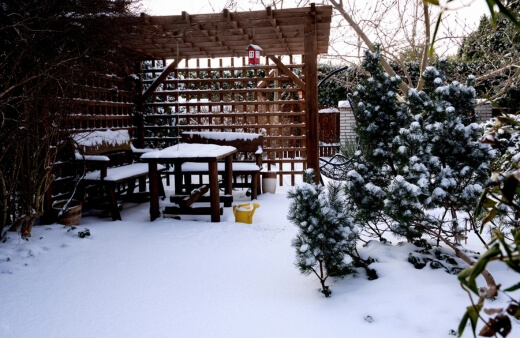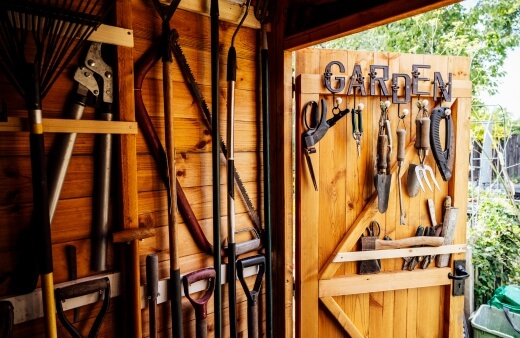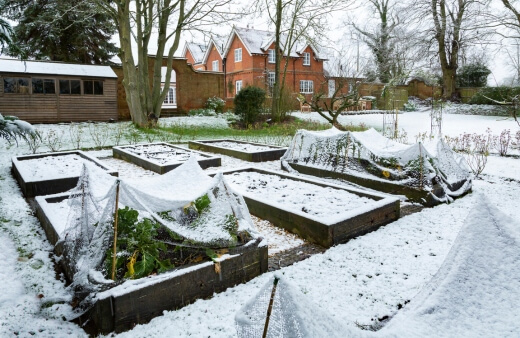As any experienced green thumb will tell you, winter gardening is crucial for preserving the health and vitality of your outdoor space. As temperatures plummet, plants become vulnerable to frost, freeze damage, and soil erosion.
In this guide, we will dig into winter gardening and what you need to do to prepare your garden for winter.
More...
What is Winter Gardening?

Proper winter gardening preparation provides necessary insulation, shielding plants from harsh weather, and mitigates soil nutrient loss, ensuring plant nourishment. This helps perennial plants to survive and thrive post-winter, reducing the need for new plantings.
In addition, it protects garden structures and equipment like your irrigation system or Hampton-style planter boxes that you worked so hard to install and maintain during the Spring and Summer months.
Importantly, winter garden preparations also involve composting and mulching, which enhance soil fertility and structure for the upcoming growing season.
Proper winter care cultivates a vibrant, healthier garden, ready to burst into life in the spring. Hence, seasonal preparation is not only a proactive measure for plant survival but also an investment in your garden's future productivity and beauty.
Preparing Your Garden for Winter
Clean Up Your Garden

Mid to late Autumn is the perfect time to switch into winter gardening mode and give your outdoor space some much-needed care and attention. It’s also the best time to prepare your garden for winter. There are a few things you can do to tidy up your backyard.
If you have trees that drop their leaves, rake them all up into a pile which you can either compost or dispose of in your green waste bin. While you’re at it, remove any other random debris that has accumulated over time.
If any annual plants are dead, now is the perfect time to uproot, compost, or dispose of them. This will prevent the spread of disease and pests that might get attracted to the decaying organic matter.
If your garden is large and this seems like a mammoth task, ask your friends and family to help. Arrange a working bee, and feed everyone lunch or dinner afterwards.
Amend and Insulate Your Soil
As part of your winter garden preparations, now is the perfect time to amend, insulate and give your soil some much-needed nutrients. You can do this in a few ways. If you compost, spread a decent layer of compost over your garden beds.
The decaying organic matter will give your soil some excellent nutrients and boost your plants and seedlings. You can also use other organic matter, such as mulch, for this purpose.
While you’re at it, add some slow-release fertiliser to your garden to improve soil health. If you use mulch, cover your garden beds with a thick layer, insulating the soil and protecting your plant’s roots from freezing, frosty overnight temperatures.
Plant Cover Crops or Winter Hardy Plants
Another excellent tip for preparing your garden for winter is to plant some appropriate plants for the season. This is especially pertinent if you have an edible garden. For instance, you can plant kale, spinach and winter greens, which will easily withstand the cold weather and provide a great harvest that you can use in meals or give to friends and family.


Get Your Free Guide:
Master Growing Australian Natives eBook
A Must Have Complete Guide for Every Australian Garden
Get Your Free Guide:
Master Growing Australian Natives eBook
A Must Have Complete Guide for Every Australian Garden
Maintain and Prepare Your Garden Tools and Equipment

This is the perfect time to give your garden tools and equipment some much-needed TLC. Ensure you clean and sharpen your secateurs and loppers to prevent rust and damage. Do the same for your trowels, shovels, forks, garden edgers and other garden tools.
This will prevent damage over the cold months. Also, store them appropriately, such as in your garden shed or garage.
Plan for the Next Growing Season
Winter gardening is hands-on, but Autumn is also the best time to take stock and prepare and plan for the next growing season. You can spend the colder months bundled up inside, nice and warm, and research some new plants to grow.
You can also design a new garden layout, prepare for an extensive landscaping overhaul, or even start a garden journal to keep track of your gardening successes, challenges and opportunities.
Avoid Pruning
Don’t prune your trees or shrubs right before winter hits. Even if they look wild or overgrown, wait until the spring. Pruning will remove tissue and open wounds that won’t have the proper time to heal before the frosty mornings arrive.
Pruning also stimulates a plant in an attempt to grow the limbs back, and any new growth is not likely to survive the winter, as it won’t have time to harden and become sturdy.
Winter Vegetables to Grow
Winter in Australia presents an opportune time to nurture a bountiful home garden teeming with a variety of vegetables. Despite the colder temperatures, several resilient veggies thrive in the winter conditions:

Leafy greens
Spinach, kale, and silverbeet relish the cooler climate, continually producing fresh leaves for hearty winter soups or salads. Opt for well-drained soil rich in organic matter, and ensure a spacing of 2-3 inches between plants to allow for adequate air circulation.
Regular watering, avoiding waterlogged soil, and periodic fertilising ensure healthy growth.
Root vegetables
Carrots, turnips, and beetroot, also prosper in winter, their sweet, earthy flavours intensifying with the frost. For a vibrant splash of colour in your garden, consider growing radishes and rainbow chard.
Plant seeds in loose, well-drained soil about 2 inches apart and 1/2 and inch deep, ensuring they get full sunlight. Regular, consistent watering is crucial.
Cruciferous vegetables
Broccoli, cauliflower, and brussel sprouts are other excellent winter choices, proving not only hardy but also high in vitamins and minerals, essential for boosting immunity during the chillier months. Plant seedlings in a sunny location, ensuring sufficient spacing for growth.
Provide consistent moisture without waterlogging the soil. Apply a balanced fertiliser periodically for optimal health and to support robust development.
Growing these vegetables during winter ensures a continuous supply of fresh, homegrown produce, contributing to healthy meals and a sustainable lifestyle.
Now Your Know How to Prepare Your Garden for Winter
This helpful article has shared six simple ways to prepare your garden for winter. Follow these tips to give your backyard the best chance to survive and thrive come springtime.
Published on May 19, 2023 by Gary Clarke
Last Updated on September 9, 2025




